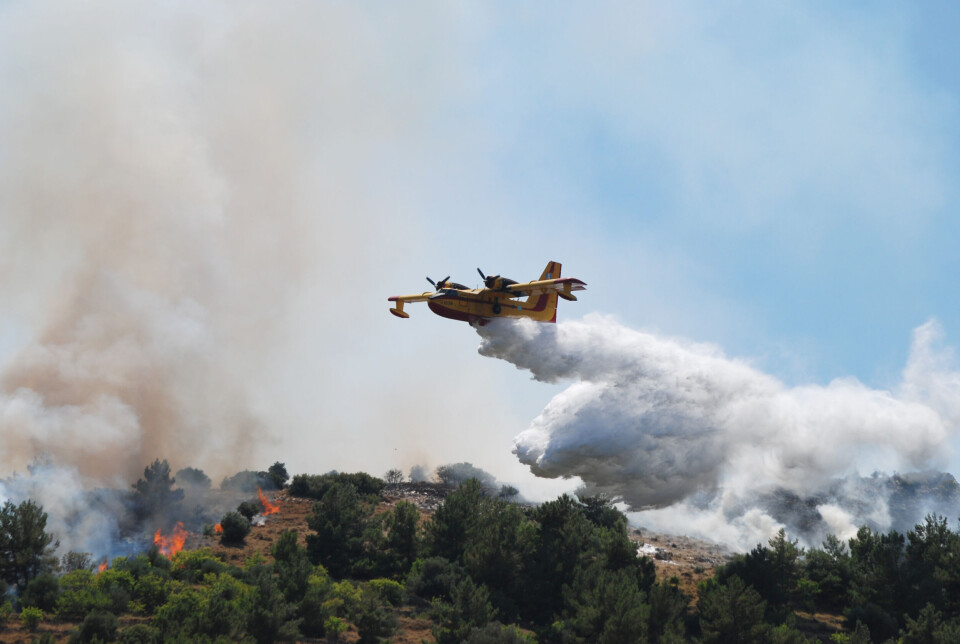-
Communes across France start fight against tiger mosquitoes with resident help
It comes as the mosquitoes continue to proliferate and spread disease
-
High demand for relaunch of Ryanair’s London - France route
Many UK residents own second homes in region
-
Visa delivery policy review ordered by French PM
'France welcomed more than half a million additional immigrants in 2024 - an unprecedented level', said François Bayrou
French firefighter pilots plan strike ahead of ‘worryingly’ dry summer
The Canadair and Dash plane pilots say they are ‘sounding the alarm’ over pay delays and lack of recognition for the danger of their profession as wildfire risks continue

Pilots of planes specially designed to fight wildfires say they will go on strike this summer and refuse to attend fires unless their working conditions and pay are improved.
Pilots from la Sécurité civile, who fly Canadair and Dash planes, have posted notice of a strike for July 1. This is the first day of the usual season for these “firefighters of the sky”.
It comes three months ahead of high summer when the risk of wildfires, especially in the south of France, increases considerably. A strike would be indeed very worrying in particular for the Provence-Alpes-Côte d'Azur (Paca) region.
Stéphan Le Bars, secretary-general of the national union of civil aviation personnel le syndicat national des personnels navigants de l'aéronautique civile (SNPNAC), told France 3: “We have been sounding the alarm for years.
“For years we have been asking for our work to be recognised, for pilots to stop going to the fire without being paid, but we have never been listened to.
He added that the strike action was difficult for the pilots and had been a last resort. He said: “We love our job, flying is part of our DNA. So to say 'we're not taking the planes out', as pilots, hurts us.”
‘Pay delays of six months’
The union has denounced the fact that the financial management of the division is centralised in Paris, and claims that this system has been the cause of several issues, including significant delays in flight bonus payments, which can make up 65% of pilots’ salaries.
Mr Le Bars said that there had been “delays of four months, six months”, and up to 10-20% missing from the payments when they were finally made.
He said: “The worst time is the 25th-26th of the month. You see all the guys at work looking at their phones waiting for their pay to come in on the banking app. I've never seen that!”
‘Stress, tension and lack of recognition’
The secretary-general said that the delays had been a source of considerable tension and stress for pilots, and had meant they had often gone out on flights without having been paid. He said: “People come to us with problems, and we need to have pilots who get into planes feeling calm and peaceful.”
The pilots are also calling for recognition that they risk their lives as part of the job. The names of 34 pilots who have died while working are engraved in marble at the entrance of their base.
Mr Le Bars said: “Our profession is still not recognised as risky; it's unbelievable. This must be changed quickly.”
The union leader also said that there is a shortage of planes that can be used for staff training.
He said that the 88 pilots from the Sécurité civile often get forgotten about by their managing body, the Interior Ministry, until they are needed. He said that a strike was the only way to get their attention.
He said: “It’s only when we say, ‘There won’t be any planes’ that they realise that we are a weapon, and an indispensable insurance.”
Mr Le Bars added that he was “very, very worried” about the state of vegetation in the Var department, and the risk of possible fires due to “no rain for the past two months and 50-60km/h winds over three weeks.”
The pilots have already secured monthly and quarterly – as opposed to annual – checks on their salaries, flight bonuses and a hierarchical structure allowing for promotions.
And while this has been seen as a positive step, Mr Le Bars warned that the pilots “were not letting up on the pressure”, and is still waiting to see the results of discussions over the next two weeks. Pilots and managers could commit to a new protocol by April 26.
Wildfire risk
Wildfires have become a bigger issue in recent years. Every year for the past decade, the south of France has suffered major, devastating blazes.
In August 2021, 7,000 hectares of land were destroyed in the Maures massif, making it the largest fire for the past 30 years in the area. The blaze was later discovered to have been caused by a cigarette butt.
Read more: Cigarette butt likely cause of fatal south of France wildfire
Read more: Investigation into cause of Var wildfire begins as blaze slows
Canadair and Bombardier pilots supported firefighters on the ground, who attended the fire for seven days. Two people died and more than 20 people were injured.
It comes as the wildfire risk has emerged early this year, as unusually dry weather caused evacuations of homes across France late last month, including in Provence-Alpes-Côte d’Azur, Nouvelle-Aquitaine, and Auvergne-Rhône-Alpes.
Related articles
Homes evacuated: Dry weather leads to multiple wildfires across France
Climate change in France: People ‘do not understand what’s coming’
Passing drivers stop man as he tries to start a new fire in Var forest
























